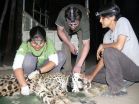(Press-News.org) A study by a Wayne State University and Children's Hospital of Michigan, Detroit Medical Center research team is shedding new light on the troubling question of whether the drugs often given to HIV-positive pregnant women can cause significant long-term heart problems for the non-HIV-infected babies they carry.
The study recently published in the journal AIDS shows that while the HIV medications have been successful in helping to prevent the transmission of the virus from mother to infant, they are associated with persistently impaired development of heart muscle and reduced heart performance in non-HIV-infected children whose mothers received the medicines years earlier.
"What our study indicates is that there's potentially a long-term price to be paid for protecting the children of HIV-infected mothers from the virus," said Steven E. Lipshultz, M.D., pediatrician-in-chief at the Children's Hospital of Michigan and chair of pediatrics for the Wayne State University School of Medicine. Dr. Lipshultz is a specialist in the study of long-term toxic cardiac effects among children affected by cancer and HIV drug therapies.
"These medicines have been very effective at reducing the rate of transmission of HIV from mother to child," added Dr. Lipshultz, the lead author of the study, "but the findings we've just published show clearly that further investigation of their long-term impact on the heart health of the children involved is needed.
"Thanks to the new anti-HIV medications, the rate of transmission has been lowered from 26 percent to less than 1 percent during the past few decades, and that has been a miracle of life for the children involved. Still, we don't want to be protecting these children from one disease, only to give them another one."
The study compared heart development and long-term heart functioning in 428 uninfected children of HIV-infected mothers to children who had not been exposed to HIV from 2007 to 2012. The results pointed to a significant association between lagging heart muscle development and impaired pumping ability in the children of the HIV-infected mothers who had received the medications.
"These findings clearly indicate the need for further study," said Dr. Lipshultz, while pointing to one of the study's key conclusions: "Subclinical differences in left ventricular structure and function with specific in-utero antiviral exposures indicate the need for a longitudinal study to assess long-term cardiac risk and cardiac monitoring recommendations."
Dr. Lipshultz, a nationally recognized expert on pediatric cardiac care who 20 years ago led the effort to found the nation's only registry of pediatric cardiomyopathy, said the study is a "compelling example of how clinical research can be effective in helping to shed light on complex problems in pediatric health care."
The Children's Research Center of Michigan team, located at the Children's Hospital of Michigan, involved with this National Institutes of Health-supported multicenter study includes James Wilkinson, M.D., associate director of the center and professor of pediatrics, and research assistant Joslyn Westphal, M.P.H.
Dr. Wilkinson stressed the study "raises the question of how much do we know about the long-term safety of drugs given to children?" He is concerned that "pediatric drug studies remain particularly limited. The lack of information about the long-term safety of drugs prescribed for children is a special worry, both for drugs that may be used for decades for chronic conditions and for drugs for which short-term use may be found to harm children's growth and development months or years later. Although these are effective medicines for children, in order to understand their safety, long-term pediatric safety studies are needed to potentially allow future options for improvement if serious safety risks are identified."
"At the end of the day, our goal at the Children's Hospital of Michigan is to provide the very best possible care for our patients," Dr. Lipshultz said. "Studies like this one are crucially important for meeting that challenge."
The PHACS (Pediatric HIV/AIDS Cohort Study) is the largest US government study of pediatric HIV and AIDS with over 30 centers. It is a trans-National Institutes of Health study with 10 NIH institutes and centers participating and funding PHACS. Since PHACS's inception more than a decade ago, Dr. Lipshultz has been the NIH-funded cardiology leader of PHACS, a member of its scientific leadership group, and the inaugural and only chair of the NIH PHACS Cardiovascular Task Force, the group which led this study.
INFORMATION:
About the Children's Hospital of Michigan
For more than 125 years, the Children's Hospital of Michigan is the first hospital in the state dedicated exclusively to the treatment of children. With more than 40 pediatric medical and surgical specialties and services, the hospital is a leader internationally in neurology and neurosurgery, cardiology, oncology, and diagnostic services; it is ranked one of America's best hospitals for children by US News and World Report and Parent Magazine and is recognized for quality and safety by the Leapfrog Group. The Children's Hospital of Michigan is one of eight hospitals operated by the Detroit Medical Center (DMC).
About
Wayne State University
Wayne State University is a premier urban research institution offering more than 400 academic programs through 13 schools and colleges to nearly 32,000 students. Its School of Medicine is the largest single-campus medical school in the nation with more than 1,200 medical students. In addition to undergraduate medical education, the school offers master's degree, Ph.D. and M.D.-Ph.D. programs in 14 areas of basic science to about 400 students annually.
An intervention that uses music and games to help preschoolers learn self-regulation skills is helping prepare at-risk children for kindergarten, a new study from Oregon State University shows.
Self-regulation skills - the skills that help children pay attention, follow directions, stay on task and persist through difficulty - are critical to a child's success in kindergarten and beyond, said OSU's Megan McClelland, a nationally recognized expert in child development and a co-author of the new study.
"Most children do just fine in the transition to kindergarten, but ...
We are all familiar with the hassles that accompany air travel. We shuffle through long lines, remove our shoes, and carry liquids in regulation-sized tubes. And even after all the effort, we still wonder if these procedures are making us any safer. Now a new type of security detection that uses terahertz radiation is looking to prove its promise. Able to detect explosives, chemical agents, and dangerous biological substances from safe distances, devices using terahertz waves could make public spaces more secure than ever.
But current terahertz sources are large, multi-component ...
You're at a slumber party with your friends. One friend asks "if a guy at school asked you out, but you weren't really attracted to him, would you go?" You laugh and shake your head no: "Why would I, if he's not my type?"
Or imagine you're at school, sitting in the cafeteria. A guy who you think is attractive but who has some unsuitable personality traits comes up and asks you out. You say yes, even though what you really meant to say was no. "Why did I do that?" you wonder.
According to new research from the University of Toronto and Yale University, rejecting unsuitable ...
As an actress, producer, director and theatre arts lecturer at The University of Texas at Arlington, Julienne Greer knows the techniques that help draw people's deepest emotions to the surface. Now, she's building on her experience and research to help scientists and robotics engineers better understand the human experience so that they can build more responsive robots.
Greer, who holds a master's degree in media arts and a doctorate in humanities, recently authored the paper, "Building emotional authenticity between humans and robots." In it, she referenced a robot named ...
OAKLAND, Calif., Nov. 21, 2014 -- Digoxin, a drug commonly used to treat heart conditions, was associated with a 71 percent higher risk of death and a 63 percent higher risk of hospitalization among adults with diagnosed atrial fibrillation and no evidence of heart failure, according to a Kaiser Permanente study that appears in the current online issue of Circulation: Arrhythmia and Electrophysiology.
Digoxin is a drug derived from digitalis, which has been used for more than a century for heart-rate control in patients with atrial fibrillation, and it remains commonly ...
Patients who receive more cells get significant benefits. That's a key lesson emerging from a clinical trial that was reported this week at the American Heart Association meeting in Chicago.
In this study, doctors treated heart attack patients with their own bone marrow cells, selected for their healing potential and then reinjected into the heart, in an effort to improve the heart's recovery.
In the PreSERVE-AMI phase II trial, physicians from 60 sites treated 161 patients, making the study one of the largest to assess cell therapy for heart attacks in the United States. ...
Scientists have identified four new genes associated with the severe food allergy eosinophilic esophagitis (EoE). Because the genes appear to have roles in other allergic diseases and in inflammation, the findings may point toward potential new treatments for EoE.
"This research adds to the evidence that genetic factors play key roles in EoE, and broadens our knowledge of biological networks that may offer attractive targets for therapy," said study leader Hakon Hakonarson, M.D., Ph.D., director of the Center for Applied Genomics at The Children's Hospital of Philadelphia ...
Study says leopards stay surprisingly close to homes
Leopard home range around humans can be comparable to world's best protected areas
Article available from PLOS ONE
NEW YORK (November 21, 2014) - In the first-ever GPS-based study of leopards in India, led by WCS and partners has delved into the secret lives of these big cats, and recorded their strategies to thrive in human-dominated areas.
The study concludes that leopards in human areas are not always 'stray' or 'conflict' animals but residents, potentially requiring policy makers to rethink India's leopard-management ...
November 21, 2014 -- A study conducted by researchers at Columbia University's Mailman School of Public Health shows that obesity costs the U.S. $8.65 billion per year as a result of absenteeism in the workplace --more than 9% of all absenteeism costs. The consequences of obesity among the working population go beyond healthcare and create a financial challenge not only for the nation but for individual states as well. Findings are published online in the Journal of Occupational and Environmental Medicine.
The study is the first to provide state-level estimates of obesity-attributable ...
Lugano/Geneva, Switzerland, 21 November 2014 - New evidence that immune checkpoint inhibitors may work in glioblastoma and brain metastases was presented today by Dr Anna Sophie Berghoff at the ESMO Symposium on Immuno-Oncology 2014 in Geneva, Switzerland.
The novel research shows that brain metastases have dense concentrations of tumour infiltrating lymphocytes, providing an immunoactive environment. Moreover, both primary and secondary brain cancers often exhibit high expression of the immunosuppressive factor programmed cell death ligand 1 (PDL1), which can be inhibited ...



